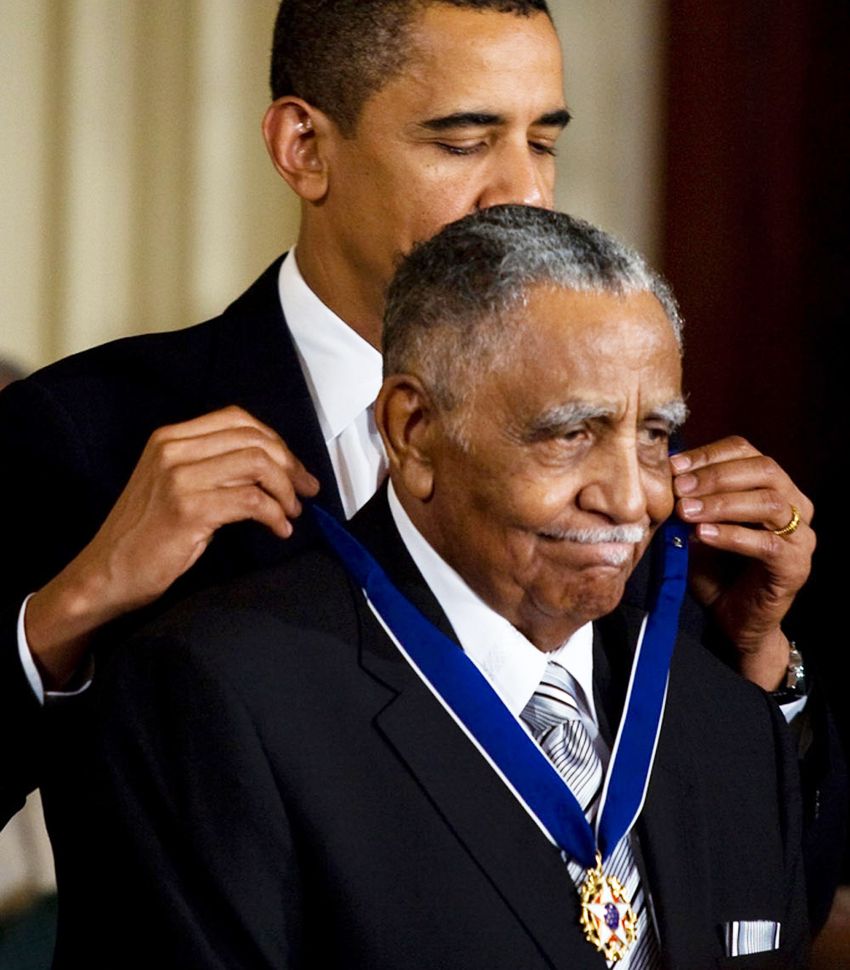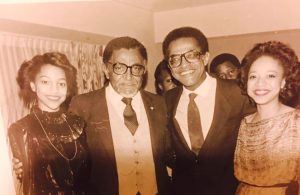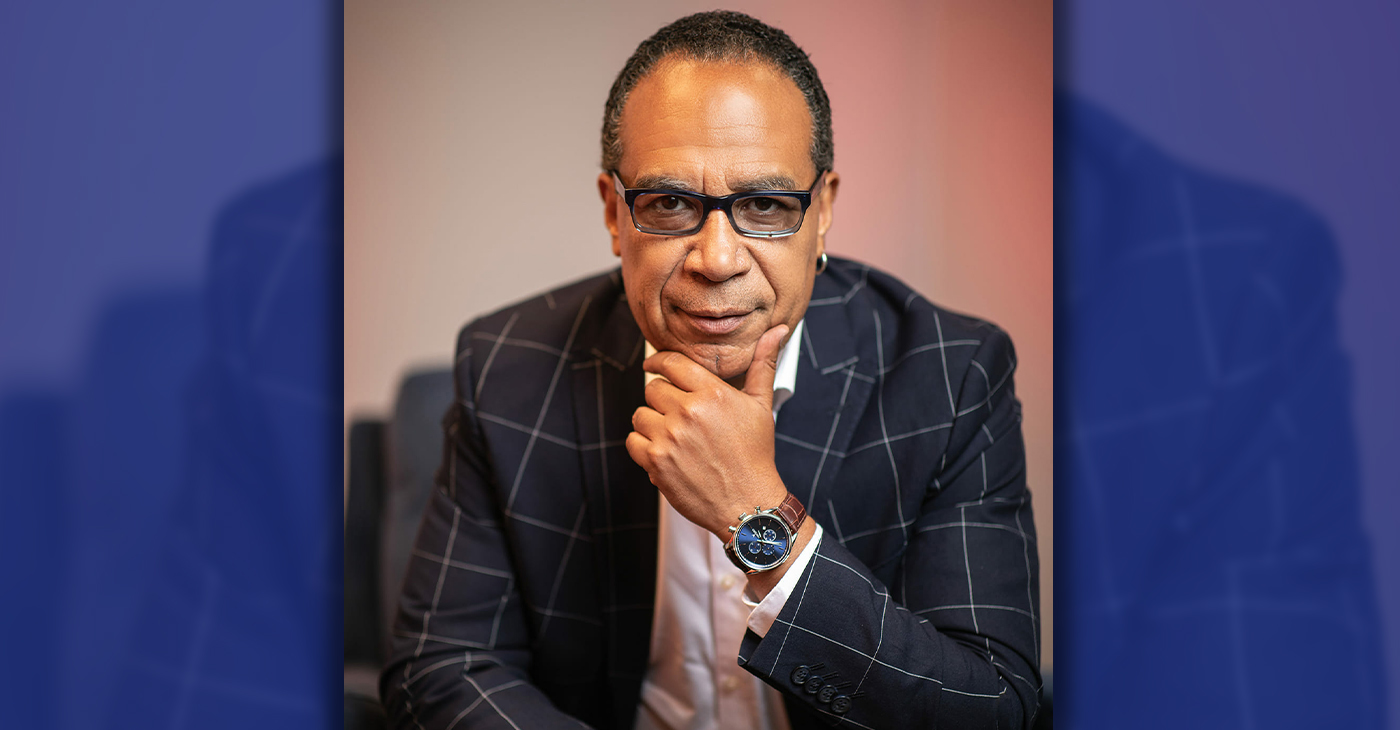Bay Area
Rev. Joseph Lowery, 98, Civil Rights Giant, Preacher

Rev. Joseph Lowery was a civil rights giant. He was a Methodist preacher, a leader of the 1955 Montgomery Bus Boycott, an organizer of the 1963 March on Washington and a close confidant of Rev. Martin Luther King, Jr.
A fighter for human rights, voting rights and the rights of African Americans in a nation with 300 years of systematic racism against Blacks in its rear-view mirror, Rev. Lowery was often referred to as the “dean” of the American Civil Rights Movement.
“Black people need to understand that the right to vote was not a gift of our political system but came as a result of blood, sweat and tears,” Lowery said in 1985.
Joseph Lowery was born in Huntsville, Ala., in 1921 and his father owned a grocery store. After an incident in the store with a racist police officer, he decided to dedicate his life to civil rights work.
After graduating from college, Lowery became an ordained Methodist minister who served congregations in Alabama and Georgia. He later became a peace activist, joining the fight against segregation and organizing marches in Selma and Birmingham, Alabama. He served nearly half a century as a pastor, spending much of that time with Central United Methodist and Cascade United Methodist in Atlanta, Ga.

John George’s daughters flank Rev. Joseph Lowery and John George: At left is Angela George and at right is Pamela Y. George, when Lowery visited Oakland in 1985. Photo courtesy of Pamela Y. George.
In 1957, along with Dr. King, Lowery founded the Southern Christian Leadership Conference and led the organization from 1977 to 1997. Rev. Lowery’s life of leadership was unmatched by any living American other than perhaps Congressman John Lewis.
“A good man passes here. He will be missed. He contributed. He changed things. He’s been Promoted. Gone on, to a better place,” wrote businessman John Hope Bryant on social media after news of Lowery’s death.
“Rest in Power to Rev. Joseph Lowery. Saw him speak against the death penalty years ago. He said that the criminal justice system was still as racist as it was a century ago and for people in prison, we might as well still travel by horse instead of by car. Never forgot that,” wrote journalist Dave Zirin.
“Dr. Joseph Lowery, the dean of the Civil Rights Movement has passed. He was a mentor, pastor, and friend to me. The world is a better place because of him and I’m a better person because of his investment in me. May he Rest In Peace as he joins his wife & Dr. King on the other side,” wrote Rev. Al Sharpton.
Lowery delivered benediction at Pres. Barack Obama’s inauguration. On July 30, 2009, Obama awarded him the Medal of Freedom. Much like Congressman Lewis, there are not many awards and honors Lowery hasn’t received.
Lowery was a member of Alpha Phi Alpha fraternity. His second wife, Evelyn, died in 2013. He is survived by five children
“Tonight, the great Reverend Joseph E. Lowery transitioned from Earth to eternity. Our thoughts and prayers are with his family. He was a champion for civil rights, a challenger of injustice, a dear friend to the King family. Thank you, sir,” read a tweet from the King Center on the night of March 27.
Activism
UC Berkeley’s 2024 Winter Commencement: A Day of Reflection, Celebration and Advice
In his remarks, Chancellor Rich Lyons encouraged graduates to consider all that they will carry with them. “You value truth and know it must be protected. You believe in science. You know that conventional wisdom and the status quo can and must always be challenged in order to find a better way,” he said. “I can only hope you share the gratitude I feel for these attributes, values, and aspirations that form the foundation of all that Berkeley is and stands for.”

By Amy Cranch, UC Berkeley News
Prisha Bhadra said her journey to graduate from UC Berkeley began long before she set foot on campus. Her parents, who immigrated from India, “left behind familiarity, security, and every single loved one they had” to give her the chance to choose her own path. For students with immigrant roots, she said, “This moment feels bigger than just us. It’s the product of generations of hope. … This degree doesn’t just belong to me. It belongs to them.”
Bhadra, who majored in political science and minored in South Asian studies, represented more than 1,000 undergraduate and graduate students as the student speaker for the Class of 2024 Winter Commencement in Haas Pavilion on Dec. 21. Nearly 9,000 guests cheered the graduates on as their names were called and they walked across the court — often pausing to dance, take a selfie, or wave to proud onlookers.

Prisha Bhadra, class of 2024, is the daughter of Indian immigrants who left everything behind for her to have the opportunity for her education. Photo by Keegan Houser/UC Berkeley.
Later in the ceremony, Chancellor Rich Lyons presented the Elise and Walter A. Haas International Award to Khadija Bakhtiar, who received a master’s degree in public policy in 2010. The award annually honors a UC Berkeley alum with a distinguished record of service to another country.
Bakhtiar founded Teach For Pakistan, which has recruited 600 talented young Pakistani graduates to teach more than 30,000 students in high-need public schools. She has also catalyzed a national movement to eliminate educational inequity and push for government investment in teacher-leadership models.
Commenting on her journey — which began at Berkeley, where she learned about Teach For America — Bakhtiar said that people didn’t think the program would work in Pakistan “because children from low-income backgrounds can’t make such rapid progress, or because public schools and school systems are too far gone to change,” she said. “It felt like I could see what lies beyond the mountain, but others couldn’t.”

Khadija Bakhtiar, left, received the Elise and Walter A. Haas International Award from UC Berkley Chancellor Rich Lyons. Photo by Keegan Houser/UC Berkeley.
But staying the course has reaped rewards. “I would have missed the moment where students are no longer ‘beneficiaries’ of a teaching program but ask in every school and classroom I visit, … ‘Tell us how we can help the larger movement,’” she said. “I might not have seen the young people who were floundering and overwhelmed in their first months of teaching grow to become school leaders, teacher trainers, entrepreneurs, [or] government advisers supporting learning for hundreds of thousands kids.”
In his remarks, Lyons encouraged graduates to consider all that they will carry with them. “You value truth and know it must be protected. You believe in science. You know that conventional wisdom and the status quo can and must always be challenged in order to find a better way,” he said. “I can only hope you share the gratitude I feel for these attributes, values, and aspirations that form the foundation of all that Berkeley is and stands for.”
Below, a few graduates share their favorite memories, advice for future students, and other tidbits on their Berkeley experience. Their responses have been edited for length and clarity.
Muki Barkan, Oakland, CA, law

Muki Barkan of Oakland, who received his degree in law, will take up criminal defense. Photo by Keegan Houser/UC Berkeley.
Favorite class: A post-conviction and sentencing practicum with Chesa Boudin, the former district attorney of San Francisco. We got to help draft sentencing motions that the Alameda County DA would then file, and a good number of people who’d spent decades in prison got out because of it. That was pretty cool.
Aha moment: I came in wanting to do tenants’ defense and tenants’ rights, and I worked for the East Bay Community Law Center for a summer. That was interesting, but I really found that criminal defense was what I preferred when a friend of mine was unfairly convicted in Marin County for all kinds of reasons. That really struck me.
Extracurricular activities: I had a job outside of campus. I had a community in Oakland, so I did food distribution that I’ve been doing since before I came here, and sometimes we organized care villages. I spend a lot of time hiking in the hills by Berkeley, foraging mushrooms. I’ve got my chanterelle spots up there.
Lester Cedeño, San Bernardino, CA, integrative biology with an emphasis in human anatomy
What you’ll miss most: The faculty. Every single one of the professors I had in integrative biology was so in tune with the courses that they teach and the wellness of their students. I’m going to miss that mentorship.
Jamie Hernandez, San Bernardino, CA, integrative biology
Favorite class: California natural history. A few years ago the teacher took us to the UC natural reserve in Pt. Reyes. He had memorized like a thousand bird calls. During the trip he would stop the car, pull out the binoculars, and make us look at the birds. It was a really good experience.
Monica Gomez, Vallejo, CA, integrative biology with an emphasis in wellness
What you’ll miss most: I appreciated all the libraries that we have here. They’re so big, and there are so many to choose from.
Activism
2024 in Review: 7 Questions for Equality California Political Director Shay Franco-Clausen
Shay Franco-Clausen is an award-winning public advocate, speaker, political strategist and former elected official. She has contributed her thought leadership to drafting seventeen pieces of legislation in California. Notable among these accomplishments is her role in extending the statute of limitations for felony domestic violence survivors, advocating for the rights of foster youth, preserving endangered open spaces, and championing the restoration of voting rights for individuals on parole.

By Edward Henderson, California Black Media
Shay Franco-Clausen is Political Director for Equality California, the nation’s largest statewide LGBTQ+ civil rights organization.
Franco-Clausen is an award-winning public advocate, speaker, political strategist and former elected official. She has contributed her thought leadership to drafting seventeen pieces of legislation in California. Notable among these accomplishments is her role in extending the statute of limitations for felony domestic violence survivors, advocating for the rights of foster youth, preserving endangered open spaces, and championing the restoration of voting rights for individuals on parole.
California Black Media (CBM) spoke with Franco-Clausen about her successes, frustrations and future plans heading into 2025.
Looking back at 2024, what stands out to you as your most important achievement and why?
In the role that I sit in as the political director for Equality California, we endorsed 216 candidates. I think the one achievement after this election that I’m proud of is that we overturned Prop 8 to protect same-sex marriages here because they’re about to attack our rights on the federal level, come 2025.
I’m glad at least we changed our California constitution to reflect and protect my marriage.
How did your leadership and investments contribute to improving the lives of Black Californians?
I contribute through my lived experience. I may have achieved a lot, but I come from those same communities that are marginalized, East Oakland, East San Jose, Watts. It gives me a different perspective. I am a formerly incarcerated youth who was in foster care. I think I contribute that bit of understanding, and I operate from an equity lens. I’m willing to push people to make them recognize that hey, you cannot forget about Black people. We are the most marginalized.
What frustrated you the most over the last year?
What frustrates me is our inability to recognize that we forget people. I was tapped to work on the Harris campaign from Equality California. And through that, being at that table, I was frustrated that they weren’t listening to Americans and not looking at the data.
The reason Trump won is because he had consistent messaging, and we didn’t debunk it. I think I’m more frustrated that we don’t fully listen to people all the time when they’re critiquing us.
What inspired you the most over the last year?
All those people that came out to support Kamala Harris. I was proud that my son voted for the first time for a Black woman for President.
What is one lesson you learned in 2024 that will inform your decision-making next year?
Be fearless. Sometimes I second-guess myself. I push back, but I could push more because I’m qualified. I have the education, I have the experience, and I know what I’m talking about in all the rooms that I go in. And I must be confident in that.
In one word, what is the biggest challenge Black Californians face?
Prioritization.
We’re still not seen as a priority, but everyone likes to add us to their talking points.
What is the goal you want to achieve most in 2025?
Writing a book. I think it’s important for us to tell our stories.
I am also kicking off my campaign for Hayward City Council.
Activism
2024 in Review: 7 Questions for California Black Chamber of Commerce CEO Jay King
Jay King is also a member of the popular 1980s R&B group Club Nouveau. In his role as an artist and activist, he has stood up for issues affecting underrepresented Californians for over three decades. As the President of the CBCC, King says he is determined to put his mark on developing and expanding the capacity of African American businessmen and women.

By Edward Henderson, California Black Media
Grammy Award-winning singer and record label executive, Jay King, was elected CEO/President of the California Black Chamber of Commerce (CBCC) in June of 2019.
The CBCC is the largest African American non-profit business organization, representing thousands of small and emerging businesses, affiliates, and chambers of commerce throughout California.
King is also a member of the popular 1980s R&B group Club Nouveau. In his role as an artist and activist, he has stood up for issues affecting underrepresented Californians for over three decades.
As the President of the CBCC, King says he is determined to put his mark on developing and expanding the capacity of African American businessmen and women.
California Black Media (CBM) spoke with King recently. He reflected on the Chamber’s accomplishments, disappointments, lessons learned this year, and goals moving forward.
Looking back at 2024, what stands out as your most important achievement and why?
Making the voices of micro and mini-micro businesses loud, forcing policymakers and other decision makers across the state to pay attention to them. With legislation in place now — AB 1574 and AB 2019 – that mandates that the state and agencies affiliated with the state extend opportunities to micro and mini business owners and give them a chance to participate in government contracting in a real way.
How did your leadership and investments contribute to improving the lives of Black Californians?
I really want to contribute to the world and the state of Black businesses because of the systemic inequities in the past.
Small business, micro businesses and mini businesses are too often overlooked.
I think it would be egotistical to believe that I make any significant impact on my own. Whether it’s the Asian Chamber, Hispanic Chamber and other organizations that are fighting the same fight. I think it’s a collective, so I’m proud to be part of the collective.
What frustrated you the most over the last year?
We say we want to give access to capital to small businesses, yet we continue to create barriers that deny them access.
What inspired you the most over the last year?
Watching some of the small business owners that we worked with — these micro businesses — and seeing the potential and the power that is in front of us.
What is one lesson you learned in 2024 that will inform your decision-making next year?
We have to fight for Black business owners, but they also have to be prepared; because if they’re not, it affects us all down the line.
In one word, what is the biggest challenge Black Californians face?
Self-belief. I think we have been conditioned on victimization and victimhood. We think that if we don’t get the help we need that we will falter.
What is the goal you want to achieve most in 2025?
I want to change the trajectory of micro and mini business owners.
-

 Activism2 weeks ago
Activism2 weeks agoBooks for Ghana
-

 Activism4 weeks ago
Activism4 weeks agoPost News Group to Host Second Town Hall on Racism, Hate Crimes
-

 Arts and Culture3 weeks ago
Arts and Culture3 weeks agoPromise Marks Performs Songs of Etta James in One-Woman Show, “A Sunday Kind of Love” at the Black Repertory Theater in Berkeley
-

 Activism4 weeks ago
Activism4 weeks agoButler, Lee Celebrate Passage of Bill to Honor Congresswoman Shirley Chisholm with Congressional Gold Medal
-

 Activism3 weeks ago
Activism3 weeks ago‘Donald Trump Is Not a God:’ Rep. Bennie Thompson Blasts Trump’s Call to Jail Him
-

 Activism4 weeks ago
Activism4 weeks agoDelta Sigma Theta Alumnae Chapters Host World AIDS Day Event
-

 Business4 weeks ago
Business4 weeks agoLandlords Are Using AI to Raise Rents — And California Cities Are Leading the Pushback
-

 Bay Area2 weeks ago
Bay Area2 weeks agoGlydways Breaking Ground on 14-Acre Demonstration Facility at Hilltop Mall









































